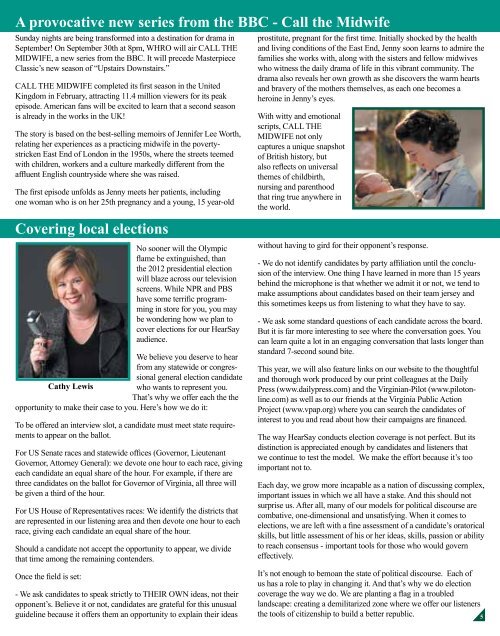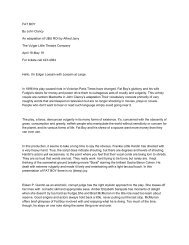WHRO presents Call the Midwife Sunday, September 30
WHRO presents Call the Midwife Sunday, September 30
WHRO presents Call the Midwife Sunday, September 30
Create successful ePaper yourself
Turn your PDF publications into a flip-book with our unique Google optimized e-Paper software.
A provocative new series from <strong>the</strong> BBC - <strong>Call</strong> <strong>the</strong> <strong>Midwife</strong><br />
<strong>Sunday</strong> nights are being transformed into a destination for drama in<br />
<strong>September</strong>! On <strong>September</strong> <strong>30</strong>th at 8pm, <strong>WHRO</strong> will air CALL THE<br />
MIDWIFE, a new series from <strong>the</strong> BBC. It will precede Masterpiece<br />
Classic’s new season of “Upstairs Downstairs.”<br />
CALL THE MIDWIFE completed its first season in <strong>the</strong> United<br />
Kingdom in February, attracting 11.4 million viewers for its peak<br />
episode. American fans will be excited to learn that a second season<br />
is already in <strong>the</strong> works in <strong>the</strong> UK!<br />
The story is based on <strong>the</strong> best-selling memoirs of Jennifer Lee Worth,<br />
relating her experiences as a practicing midwife in <strong>the</strong> povertystricken<br />
East End of London in <strong>the</strong> 1950s, where <strong>the</strong> streets teemed<br />
with children, workers and a culture markedly different from <strong>the</strong><br />
affluent English countryside where she was raised.<br />
The first episode unfolds as Jenny meets her patients, including<br />
one woman who is on her 25th pregnancy and a young, 15 year-old<br />
Covering local elections<br />
No sooner will <strong>the</strong> Olympic<br />
flame be extinguished, than<br />
<strong>the</strong> 2012 presidential election<br />
will blaze across our television<br />
screens. While NPR and PBS<br />
have some terrific programming<br />
in store for you, you may<br />
be wondering how we plan to<br />
cover elections for our HearSay<br />
audience.<br />
We believe you deserve to hear<br />
from any statewide or congressional<br />
general election candidate<br />
Cathy Lewis<br />
who wants to represent you.<br />
That’s why we offer each <strong>the</strong> <strong>the</strong><br />
opportunity to make <strong>the</strong>ir case to you. Here’s how we do it:<br />
To be offered an interview slot, a candidate must meet state requirements<br />
to appear on <strong>the</strong> ballot.<br />
For US Senate races and statewide offices (Governor, Lieutenant<br />
Governor, Attorney General): we devote one hour to each race, giving<br />
each candidate an equal share of <strong>the</strong> hour. For example, if <strong>the</strong>re are<br />
three candidates on <strong>the</strong> ballot for Governor of Virginia, all three will<br />
be given a third of <strong>the</strong> hour.<br />
For US House of Representatives races: We identify <strong>the</strong> districts that<br />
are represented in our listening area and <strong>the</strong>n devote one hour to each<br />
race, giving each candidate an equal share of <strong>the</strong> hour.<br />
Should a candidate not accept <strong>the</strong> opportunity to appear, we divide<br />
that time among <strong>the</strong> remaining contenders.<br />
Once <strong>the</strong> field is set:<br />
- We ask candidates to speak strictly to THEIR OWN ideas, not <strong>the</strong>ir<br />
opponent’s. Believe it or not, candidates are grateful for this unusual<br />
guideline because it offers <strong>the</strong>m an opportunity to explain <strong>the</strong>ir ideas<br />
prostitute, pregnant for <strong>the</strong> first time. Initially shocked by <strong>the</strong> health<br />
and living conditions of <strong>the</strong> East End, Jenny soon learns to admire <strong>the</strong><br />
families she works with, along with <strong>the</strong> sisters and fellow midwives<br />
who witness <strong>the</strong> daily drama of life in this vibrant community. The<br />
drama also reveals her own growth as she discovers <strong>the</strong> warm hearts<br />
and bravery of <strong>the</strong> mo<strong>the</strong>rs <strong>the</strong>mselves, as each one becomes a<br />
heroine in Jenny’s eyes.<br />
With witty and emotional<br />
scripts, CALL THE<br />
MIDWIFE not only<br />
captures a unique snapshot<br />
of British history, but<br />
also reflects on universal<br />
<strong>the</strong>mes of childbirth,<br />
nursing and parenthood<br />
that ring true anywhere in<br />
<strong>the</strong> world.<br />
without having to gird for <strong>the</strong>ir opponent’s response.<br />
- We do not identify candidates by party affiliation until <strong>the</strong> conclusion<br />
of <strong>the</strong> interview. One thing I have learned in more than 15 years<br />
behind <strong>the</strong> microphone is that whe<strong>the</strong>r we admit it or not, we tend to<br />
make assumptions about candidates based on <strong>the</strong>ir team jersey and<br />
this sometimes keeps us from listening to what <strong>the</strong>y have to say.<br />
- We ask some standard questions of each candidate across <strong>the</strong> board.<br />
But it is far more interesting to see where <strong>the</strong> conversation goes. You<br />
can learn quite a lot in an engaging conversation that lasts longer than<br />
standard 7-second sound bite.<br />
This year, we will also feature links on our website to <strong>the</strong> thoughtful<br />
and thorough work produced by our print colleagues at <strong>the</strong> Daily<br />
Press (www.dailypress.com) and <strong>the</strong> Virginian-Pilot (www.pilotonline.com)<br />
as well as to our friends at <strong>the</strong> Virginia Public Action<br />
Project (www.vpap.org) where you can search <strong>the</strong> candidates of<br />
interest to you and read about how <strong>the</strong>ir campaigns are financed.<br />
The way HearSay conducts election coverage is not perfect. But its<br />
distinction is appreciated enough by candidates and listeners that<br />
we continue to test <strong>the</strong> model. We make <strong>the</strong> effort because it’s too<br />
important not to.<br />
Each day, we grow more incapable as a nation of discussing complex,<br />
important issues in which we all have a stake. And this should not<br />
surprise us. After all, many of our models for political discourse are<br />
combative, one-dimensional and unsatisfying. When it comes to<br />
elections, we are left with a fine assessment of a candidate’s oratorical<br />
skills, but little assessment of his or her ideas, skills, passion or ability<br />
to reach consensus - important tools for those who would govern<br />
effectively.<br />
It’s not enough to bemoan <strong>the</strong> state of political discourse. Each of<br />
us has a role to play in changing it. And that’s why we do election<br />
coverage <strong>the</strong> way we do. We are planting a flag in a troubled<br />
landscape: creating a demilitarized zone where we offer our listeners<br />
<strong>the</strong> tools of citizenship to build a better republic.<br />
5



